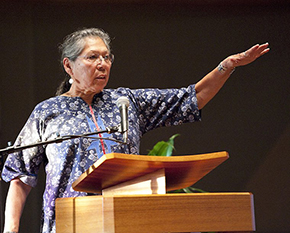Native American Heritage Month: Madonna Thunder Hawk
 In an article chronicling her history and achievements, Madonna Thunder Hawk was dubbed the “Original Gangster,” as a steadfast, powerful, unafraid warrior woman. This is fitting, given she had a hand in forming all of the core South Dakota-based organizations that push for Indian self-determination, establish alternative schooling for Native children, protect reproductive health, and guard against natural resource pollution. Through her many campaigns and continued activism, Thunder Hawk has established herself as a woman who stands her ground as a Native American and does not compromise in her efforts to prioritize the lives of America’s indigenous people. [1]
In an article chronicling her history and achievements, Madonna Thunder Hawk was dubbed the “Original Gangster,” as a steadfast, powerful, unafraid warrior woman. This is fitting, given she had a hand in forming all of the core South Dakota-based organizations that push for Indian self-determination, establish alternative schooling for Native children, protect reproductive health, and guard against natural resource pollution. Through her many campaigns and continued activism, Thunder Hawk has established herself as a woman who stands her ground as a Native American and does not compromise in her efforts to prioritize the lives of America’s indigenous people. [1]
Madonna Thunder Hawk was born in 1940 as Madonna Gilbert on the Yankton Sioux Reservation in southeastern South Dakota. She is a member of the Oohenumpa band of the Cheyenne River Sioux Tribe, and she grew up on the Cheyenne River Sioux Reservation. Her early life included the all-too-common systemic violence and assimilationist pressures of boarding schools, anti-Native racism, and federal government intrusion to which many Native Americans of her generation were subjected. [2]
Thunder Hawk’s community was later relocated to San Francisco by the federal government. There, she encountered a broad range of energized social organizers, activists, workers, and anti-war protesters. [3]
Inspired by the passion and resistance displayed by her mother and grandmother throughout her life, and the politically active individuals and organizations in San Francisco, Thunder Hawk began on a path of activism in the late 1960s. [4]
Thunder Hawk became a part of the Red Power movement – a Native American youth-led movement to fight for self-determination – through her involvement with the American Indian Movement (AIM). During her time with AIM, the organization shed light on police harassment and brutality, fostered a network of urban Indian centers and philanthropic organizations, and managed mounting court cases against the federal government to preserve Native civil rights. [5] Thunder Hawk also participated in the 19-month Occupation of Alcatraz with AIM, which set a precedent for Indian activism moving forward, laying the groundwork for other key protests and movements such as the Wounded Knee incident, occupation of Mount Rushmore, and the Longest Walk. [6]
In 1974, Thunder Hawk co-founded Women of All Red Nations (WARN) along with other AIM activists. WARN provided indigenous women with activism opportunities around issues that directly impacted Native women. For example, WARN campaigned against coerced sterilization and uranium contamination of the Pine Ridge Reservation water supply resulting from nearby mining, which caused high rates of miscarriage, cancer, and birth defects among the Lakota tribe on the reservation. [7,8,9]
Most recently, Thunder Hawk joined the movement against the Dakota Access Pipeline in 2016, camping at a protest on Standing Rock Reservation in North Dakota. [10] She continues to work as a tribal liaison for the Lakota People’s Law Project, building alliances and gathering support for Indian child welfare among South Dakota’s tribal leaders and communities. [11]
Thunder Hawk’s activism has always emphasized the need for group empowerment and achievable goals, prioritizing the importance of community accountability, and connecting rural residents of reservations to national or international policies and issues. She has maintained a talent for coalition building, even among those with whom she does not agree. Informed by her understanding of the indigenous identity as tied to the struggle for land and cultural preservation, she welcomes others into movements for indigenous peoples’ rights, looking beyond racial identity and skin color. This perspective has helped Thunder Hawk organize across races and other identity groups to maximize impact and success. [12]
Thunder Hawk’s focus on women’s health and reproductive rights and safety is particularly inspiring for us at RHAP. Carolina Reyes, one of the indigenous midwives living and working at the Standing Rock camp during the Dakota Access Pipeline protest, said, “Sovereignty for indigenous people is only going to come about through the support of women and women’s health.” [13] Knowing how essential it is that people maintain power and self-determination over their own bodies – including the right to have healthy children, when and how they want – we will continue to support efforts to increase access to comprehensive reproductive health care.
